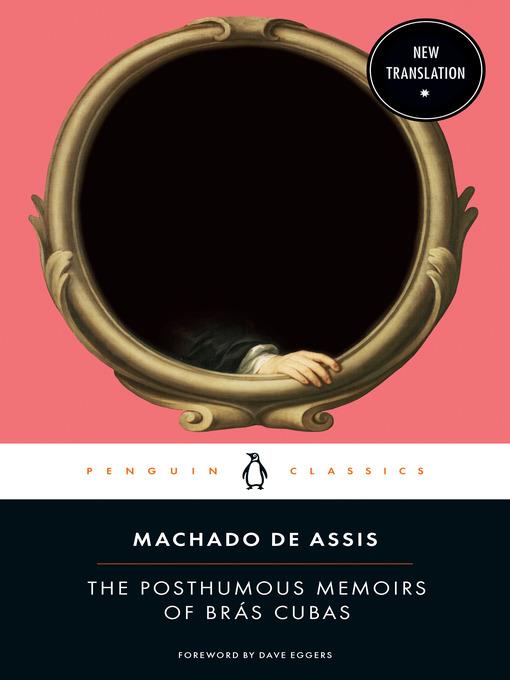
The Posthumous Memoirs of Brás Cubas
فرمت کتاب
ebook
تاریخ انتشار
2020
Lexile Score
1020
Reading Level
6-8
نویسنده
Dave Eggersشابک
9780525506683
کتاب های مرتبط
- اطلاعات
- نقد و بررسی
- دیدگاه کاربران
نقد و بررسی

Starred review from May 4, 2020
Machado de Assis’s brilliantly idiosyncratic 19th-century Brazilian classic stands alongside Don Quixote and Tristram Shandy as it follows the travails of self-described wastrel and mediocrity Brás Cubas, whose lone achievement in life has been as inventor of an antihypochondriacal miracle cure. As the novel opens, Cubas dies from pneumonia at the age of 64 and is ferried to the afterlife on the back of a giant hippopotamus. Now freed from consequence and public embarrassment, he sees fit to begin his memoirs, making a study of his lifelong indolence, dilettantism, and squandered genius. Educated at great expense in Portugal, Cubas fails to live up to early promise as a government minister in Rio de Janeiro. After his betrothed Virgilia is snatched away by a rival, Cubas settles for the life of a libertine. Matched in his mental peregrinations only by his lifelong friend, the philosopher of misery Quincas Borba, Cubas endows every episode with scintillating digressions on history and literature along with gentle mockery of his own hypocrisy and pretensions. Thomson-DeVeaux’s limpid translation captures the charm and immediacy of de Assis (1839–1908), who seduces with short bursts of playful autobiography and bursts of exclamation (“Oh! There goes my pen, slipping over into the emphatic”). His masterpiece reads like the best of dreams.

May 1, 2020
Perhaps the greatest novel by the multifaced Brazilian writer receives a fresh, lively translation. Machado (1839-1908) never met a literary form he could not master; his poems, plays, stories, newspaper articles, and other writings are all exemplary, and he is regarded as Brazil's greatest writer more than a century after his death. This novel, published in 1881, at once lampoons and celebrates the liberal ideals of the country's intelligentsia, and it's told from an odd viewpoint: that of the corpse of a generally useless minor aristocrat. "I am not exactly an author recently deceased," Br�s Cubas declares at the opening, "but a deceased man recently an author." In 160 mostly short episodes, all dedicated to the worm that took the first bite of his interred body, Br�s Cubas outlines what he's bothered to understand of the intellectual currents of his time; given the choice between praying for glory in the here and now or glory in the afterlife, for instance, he finds something else to do. One of those things is to go to Portugal and get a law degree without much enthusiasm for the project, instead acting up as "a wastrel, a superficial, troublemaking, and petulant student, given to adventures, following romanticism in practice and liberalism in theory." Back home, Br�s Cubas takes up with a married woman while yearning for a lost love, finding himself in a condition that he calls "the solidarity of human disgruntlement." Not even Aristotle could foresee the mess he's in, he concludes. Machado's pages are punctuated by nicely philosophical apothegms ("What lies between life and death? A short bridge") and fables, one of which explains the unceasing battle between reason and folly. Such passages read as if from classic texts, while his here-and-now reminiscences of lost loves and other missteps could have been written yesterday. All are highly entertaining. Machado deserves wider familiarity among English readers, and this is a fine place to start reading him.
COPYRIGHT(2020) Kirkus Reviews, ALL RIGHTS RESERVED.

























دیدگاه کاربران